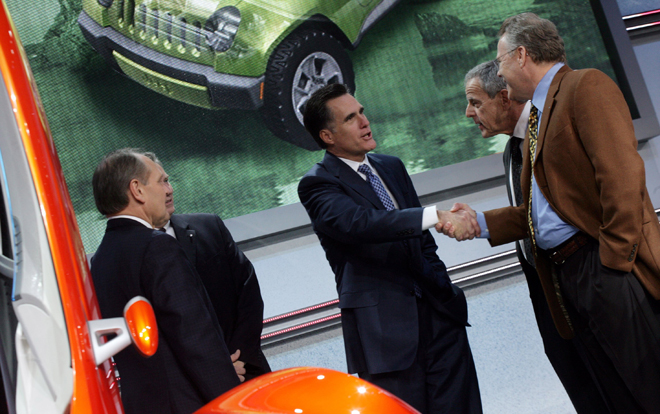One important aspect of Mitt Romney’s tough primary in Michigan this month is that it forces him to pin down his position on the auto bailout, which has been highly ambiguous over the last three years. On Wednesday Romney indicated that he may have provided direct loans to the industry — as the Obama administration did — had he been in charge at the time.
TPM this week ran a long and detailed look at Romney’s rhetoric on the issue, which has shifted in tone depending on whether he’s pitching himself to conservatives or independents. To sum up his original position: Romney famously said in 2008 that the US should let Detroit go bankrupt (see his New York Times op-ed: “Let Detroit Go Bankrupt”) and force them to restructure their companies to be competitive. But he also suggested — ten paragraphs down or so — that the federal government should help them emerge from bankruptcy intact since they were unlikely to get any private financing in the middle of an economic collapse.
What kind of help? That’s not entirely clear — he name-checked ideas like guaranteeing car warranties, for example, but was mostly silent on whether he backed the most unpopular idea among the Tea Party crowd: direct financial assistance to GM and Chrysler in order to keep the doors open. Romney’s campaign hasn’t been too excited about providing clarification, only offering TPM assurances on Wednesday that he was “willing to help make the bankruptcy work” and pointing to his 2008 op-ed when asked whether this approach was on the menu.
But Romney himself filled in a big piece of the puzzle later that day by openly acknowledging, for what appears to be the first time, that he supported providing loans to the auto industry in order to keep them afloat through bankruptcy.
“They needed to go through bankruptcy and if as part of that process they needed financial help to get out of bankruptcy, a bridge loan or guarantees for their sales of cars and so forth, I said the government should be there to provide that,” Romney told a Michigan radio station Wednesday.
This is what the Obama administration ended up doing in 2009, acting as a lender of last resort while the financial industry was too weak to step in themselves. Over the years, Romney has skirted the line between taking credit for the administration’s move and blasting them for engaging in “crony capitalism,” claiming they only helped the auto companies in order to curry favor with their unions. But on the most important question for both the left and right alike –whether to provide federal assistance to keep the auto industry from going out of business — he now says his position wasn’t all that far off from the White House.
Unfortunately for Romney, even while he can make a plausible claim that he supported spending taxpayer dollars to rescue the auto industry, he has to play up his contrasts with Obama as much as possible to court Republican voters and instead is focusing on obscure disagreements over less important features of the bailout, like whether the auto workers’ retirement fund should have included so much GM and Chrysler stock. These fights may be more favorable in an intra-party battle, but they’re largely irrelevant to the fundamental question: would Romney have rather let car companies go under than have to provide government funding?
Democrats’ downplayed his latest reveal, noting that he said in a 2008 interview he opposed a $25 billion bridge loan, although he was referring specifically to a Bush administration measure that he said did not include enough requirements for restructuring.
“As Mitt Romney throws himself at Michiganders, claiming to be one of their own, voters in Michigan just can’t shake the words he spoke in 2008, ‘Let Detroit Go Bankrupt,'” a Democratic official said. “He can’t have it both ways – he adamantly opposed bridge loans in 2008, but now wants voters to believe he would have supported them. Michigan voters know Romney will say anything to get elected and they aren’t buying it.”
As the above quote indicates, Romney’s ambiguity gives Democrats much more leeway to portray him as the scrooge who would have let the entire industry go belly up. Seeing as it’s one of the Obama campaign’s central themes for the general, that’s not good news for Romney.






